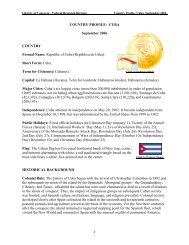1 - American Memory
1 - American Memory
1 - American Memory
You also want an ePaper? Increase the reach of your titles
YUMPU automatically turns print PDFs into web optimized ePapers that Google loves.
23<br />
fellow <strong>American</strong>s in the Pacific. Shipping Is a life-line for millions of <strong>American</strong>s<br />
living in Hawaii, Guam, Amercan Samoa and the U.S. Trust Territory. To<br />
permit the continual and haphazard interference with shipping of even the most<br />
basic commodities from the U.S. mainland to these areas is not only unjust and<br />
demeaning to the principles of lawful commerce, but it imposes undue hardship<br />
on the residents of these areas. These Innocent people are exposed to such<br />
harsh treatment, despite the fact that they have absolutely nothing whatsoever<br />
to do with the cause of the strikes, nor do they have any role in ending these<br />
labor disruptions.<br />
Before I proceed further, however, let me state quite clearly that is Is not the<br />
intent of this legislation to interfere with a duly authorized labor strike, nor<br />
do we wish to appear hostile to the vast numbers of honest, hard-working<br />
maritime workers who serve this country so well.<br />
However, before another dock strike like the one in 1971, which lasted over<br />
four months, is thrust upon us without warning, Congress must act to safe-<br />
guard off-shore <strong>American</strong>s in the Pacific from further needless economic bat-<br />
tering. We believe that this action may best be achieved by the legislation now<br />
before this Committee, which provides that all cargo from the West Coast ports<br />
destined for U.S. ports In the Pacific, as well as all cargo emanating from these<br />
same ports and bound for the U.S. West Coast ports, must be processed regard-<br />
less of a labor disruption which may be in progress.<br />
The need for such legislation is clear: Since World War II more than four (4)<br />
years of working time have been lost through transportation strikes affecting<br />
Guam, Hawaii, <strong>American</strong> Samoa, and the U.S. Trustee Territory, in addition<br />
to the economic ditficulty caused by these di-sruptlons.<br />
During the 1971-72 strike, for example, Guam was forced to purchase large<br />
amounts of food from foreign markets. Additionally, some supplies, such as chlo-<br />
rine gas (for purifying water), had to be shipped in on an emergency basis<br />
by U.S. Naval vessels. Jloreover, many local residents were unemployed for<br />
various periods of time when local business firms cut back on cost to avoid bank-<br />
ruptcy. Construction companies were hard hit by the lack of building supplies.<br />
As <strong>American</strong>s, we on Guam rely heavily on U.S. supplies to maintain our<br />
standard of living. So do the over 20,000 military personnel who are stationed<br />
on Guam. They and the local population are not satisfied with less than the best^—<br />
and that means food and other Items made only in the U.S.<br />
In order to assure that the consumer on Guam can obtain the <strong>American</strong>-made<br />
goods he wants, regardless of a strike, our merchants are forced to stockpile<br />
large amounts of their merchandise as a hedge against a possible strike. Such<br />
action, I am certain you understand, is extremely expensive. And the one who<br />
must eventually pay the bill for the luxury of stockpiling is, naturally, the con-<br />
sumer. But stockpiling Is only a partial solution. Some items, such as perish-<br />
ables, cannot be purchased and stored well in advance. There is only one way In<br />
the final analysis to assure our consumers of uninterrupted service—to keep our<br />
shipping lines open.<br />
Guam Is over 6,.500 miles from California. As an island with little locally-grown<br />
foodstuffs, or adequate sources of other material we need, a heavy volume of im-<br />
portation from the U.S. is the only way In which we can meet our needs. In 1972,<br />
for example, Guam's imports had a total of $156.0 million. Of this total, $63.9<br />
million, or 47%, came from the mainland United States.<br />
As you can see from these statistics, any long-term strike which cuts Guam<br />
and other <strong>American</strong> areas In the Pacific from our U.S. supply sources can only<br />
have serious consequences.<br />
When a strike is In progress, what alternatives do we In the Pacific have?<br />
We can resort to air-freighting in our supplies from the mainland. This method,<br />
which we did use to some extent previously is extremely expensive and slow,<br />
as planes simply do not carry large amounts of cargo. Some critical Items can<br />
perhaps be sent to us on military vessels on a "space available" basis, but the<br />
amounts would be minimal. Or, we can turn to foreign countries for our needs<br />
during the crisis.<br />
Needless to say, Guam chose the latter alternative and drew heavily on food<br />
purchases from other Pacific areas for survival. With the recent devaluation of<br />
the dollar, foreign food sources are often no longer competitive, though, with<br />
those from the mainland. Thus, the strike-bound consumer may well find him-<br />
self during the next major shipping strike with not only a limited food supply,<br />
but a budget-shattering one as well.



![Albert Einstein Papers [finding aid]. Library of Congress. [PDF ...](https://img.yumpu.com/21604228/1/190x245/albert-einstein-papers-finding-aid-library-of-congress-pdf-.jpg?quality=85)





![American Colony in Jerusalem Collection [finding aid]. Library of ...](https://img.yumpu.com/17941275/1/190x245/american-colony-in-jerusalem-collection-finding-aid-library-of-.jpg?quality=85)



![Piccard Family Papers [finding aid]. - American Memory - Library of ...](https://img.yumpu.com/17941234/1/190x245/piccard-family-papers-finding-aid-american-memory-library-of-.jpg?quality=85)


